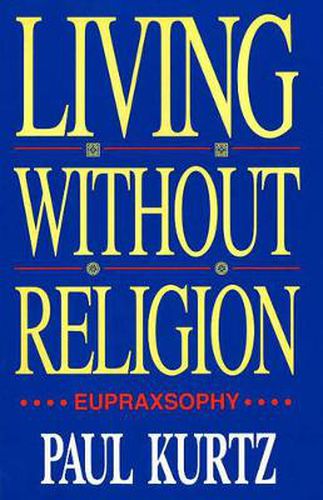Readings Newsletter
Become a Readings Member to make your shopping experience even easier.
Sign in or sign up for free!
You’re not far away from qualifying for FREE standard shipping within Australia
You’ve qualified for FREE standard shipping within Australia
The cart is loading…






Paul Kurtz is one of America’s foremost expositors of humanist philosophy. In Living without Religion , he has introduced a new word to describe humanism - eupraxsophy. Derived from the Greek roots eu (good), praxis (practice), and sophia (philosophical and scientific wisdom), eupraxophy means literally good conduct and wisdom in living . Eupraxophy draws upon the disciplines of the sciences, philosophy, and ethics - yet it is more than these. Not simply an intellectual position, eupraxophy expresses convictions about the nature of the universe and how to live one’s life with commitment and dedication. It, thus, combines both a cosmic outlook and a life stance. Kurtz maintains that the eupraxsopher can lead a meaningful life and help create a just society, and he offers concrete recommendations for the development of the humanism of the future. An entire section of the book is devoted to the careful definition of religion, which clearly demonstrates than an authentic moral life is possible without religious belief.
$9.00 standard shipping within Australia
FREE standard shipping within Australia for orders over $100.00
Express & International shipping calculated at checkout
Paul Kurtz is one of America’s foremost expositors of humanist philosophy. In Living without Religion , he has introduced a new word to describe humanism - eupraxsophy. Derived from the Greek roots eu (good), praxis (practice), and sophia (philosophical and scientific wisdom), eupraxophy means literally good conduct and wisdom in living . Eupraxophy draws upon the disciplines of the sciences, philosophy, and ethics - yet it is more than these. Not simply an intellectual position, eupraxophy expresses convictions about the nature of the universe and how to live one’s life with commitment and dedication. It, thus, combines both a cosmic outlook and a life stance. Kurtz maintains that the eupraxsopher can lead a meaningful life and help create a just society, and he offers concrete recommendations for the development of the humanism of the future. An entire section of the book is devoted to the careful definition of religion, which clearly demonstrates than an authentic moral life is possible without religious belief.